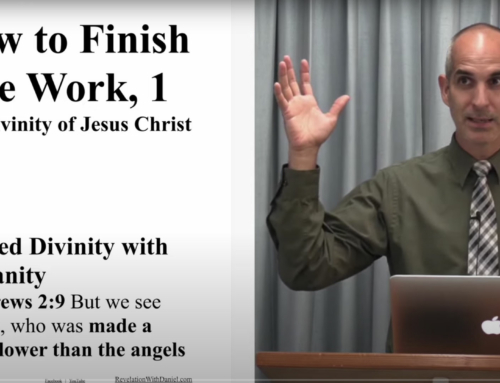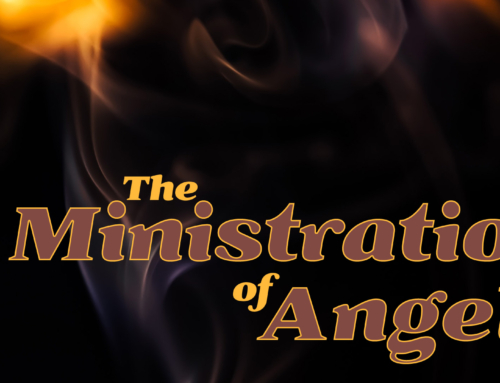
“Satan was exulting that he had succeeded in debasing the image of God in humanity. Then Jesus came to restore in man the image of his Maker. None but Christ can fashion anew the character that has been ruined by sin. He came to expel the demons that had controlled the will. He came to lift us up from the dust, to reshape the marred character after the pattern of His divine character, and to make it beautiful with His own glory. DA 37.3
“At times she wavered between Jesus and His brothers, who did not believe that He was the Sent of God; but evidence was abundant that His was a divine character. She saw Him sacrificing Himself for the good of others. His presence brought a purer atmosphere into the home, and His life was as leaven working amid the elements of society. Harmless and undefiled, He walked among the thoughtless, the rude, the uncourteous; amid the unjust publicans, the reckless prodigals, the unrighteous Samaritans, the heathen soldiers, the rough peasants, and the mixed multitude. He spoke a word of sympathy here and a word there, as He saw men weary, yet compelled to bear heavy burdens. He shared their burdens, and repeated to them the lessons He had learned from nature, of the love, the kindness, the goodness of God. DA 90.3
“John was acquainted with the events that had marked the birth of Jesus. He had heard of the visit to Jerusalem in His boyhood, and of what had passed in the school of the rabbis. He knew of His sinless life, and believed Him to be the Messiah; but of this he had no positive assurance. The fact that Jesus had for so many years remained in obscurity, giving no special evidence of His mission, gave occasion for doubt as to whether He could be the Promised One. The Baptist, however, waited in faith, believing that in God’s own time all would be made plain. It had been revealed to him that the Messiah would seek baptism at his hands, and that a sign of His divine character should then be given. Thus he would be enabled to present Him to the people. DA 109.3
“When Jesus sat down to rest at Jacob’s well, He had come from Judea, where His ministry had produced little fruit. He had been rejected by the priests and rabbis, and even the people who professed to be His disciples had failed of perceiving His divine character. He was faint and weary; yet He did not neglect the opportunity of speaking to one woman, though she was a stranger, an alien from Israel, and living in open sin. DA 194.3
“It was just before this that Jesus had a second time performed the miracle of healing a man possessed, blind and dumb, and the Pharisees had reiterated the charge, “He casteth out devils through the prince of the devils.” Matthew 9:34. Christ told them plainly that in attributing the work of the Holy Spirit to Satan, they were cutting themselves off from the fountain of blessing. Those who had spoken against Jesus Himself, not discerning His divine character, might receive forgiveness; for through the Holy Spirit they might be brought to see their error and repent. Whatever the sin, if the soul repents and believes, the guilt is washed away in the blood of Christ; but he who rejects the work of the Holy Spirit is placing himself where repentance and faith cannot come to him. It is by the Spirit that God works upon the heart; when men willfully reject the Spirit, and declare It to be from Satan, they cut off the channel by which God can communicate with them. When the Spirit is finally rejected, there is no more that God can do for the soul. DA 321.3
“When left alone, Jesus “went up into a mountain apart to pray.” For hours He continued pleading with God. Not for Himself but for men were those prayers. He prayed for power to reveal to men the divine character of His mission, that Satan might not blind their understanding and pervert their judgment. The Saviour knew that His days of personal ministry on earth were nearly ended, and that few would receive Him as their Redeemer. In travail and conflict of soul He prayed for His disciples. They were to be grievously tried. Their long-cherished hopes, based on a popular delusion, were to be disappointed in a most painful and humiliating manner. In the place of His exaltation to the throne of David they were to witness His crucifixion. This was to be indeed His true coronation. But they did not discern this, and in consequence strong temptations would come to them, which it would be difficult for them to recognize as temptations. Without the Holy Spirit to enlighten the mind and enlarge the comprehension the faith of the disciples would fail. It was painful to Jesus that their conceptions of His kingdom were, to so great a degree, limited to worldly aggrandizement and honor. For them the burden was heavy upon His heart, and He poured out His supplications with bitter agony and tears. DA 379.1
“But the people did not choose to receive this statement of divine truth. Jesus had done the very work which prophecy had foretold that the Messiah would do; but they had not witnessed what their selfish hopes had pictured as His work. Christ had indeed once fed the multitude with barley loaves; but in the days of Moses Israel had been fed with manna forty years, and far greater blessings were expected from the Messiah. Their dissatisfied hearts queried why, if Jesus could perform so many wondrous works as they had witnessed, could He not give health, strength, and riches to all His people, free them from their oppressors, and exalt them to power and honor? The fact that He claimed to be the Sent of God, and yet refused to be Israel’s king, was a mystery which they could not fathom. His refusal was misinterpreted. Many concluded that He dared not assert His claims because He Himself doubted as to the divine character of His mission. Thus they opened their hearts to unbelief, and the seed which Satan had sown bore fruit of its kind, in misunderstanding and defection. DA 385.3
“That which led the Jews to reject the Saviour’s work was the highest evidence of His divine character. The greatest significance of His miracles is seen in the fact that they were for the blessing of humanity. The highest evidence that He came from God is that His life revealed the character of God. He did the works and spoke the words of God. Such a life is the greatest of all miracles. DA 406.5
“If Jesus had paid the tribute without a protest, He would virtually have acknowledged the justice of the claim, and would thus have denied His divinity. But while He saw good to meet the demand, He denied the claim upon which it was based. In providing for the payment of the tribute He gave evidence of His divine character. It was made manifest that He was one with God, and therefore was not under tribute as a mere subject of the kingdom. DA 434.1
“Abraham had greatly desired to see the promised Saviour. He offered up the most earnest prayer that before his death he might behold the Messiah. And he saw Christ. A supernatural light was given him, and he acknowledged Christ’s divine character. He saw His day, and was glad. He was given a view of the divine sacrifice for sin. Of this sacrifice he had an illustration in his own experience. The command came to him, “Take now thy son, thine only son Isaac, whom thou lovest, … and offer him … for a burnt offering.” Genesis 22:2. Upon the altar of sacrifice he laid the son of promise, the son in whom his hopes were centered. Then as he waited beside the altar with knife upraised to obey God, he heard a voice from heaven saying, “Lay not thine hand upon the lad, neither do thou anything unto him: for now I know that thou fearest God, seeing thou hast not withheld thy son, thine only son from Me.” Genesis 22:12. This terrible ordeal was imposed upon Abraham that he might see the day of Christ, and realize the great love of God for the world, so great that to raise it from its degradation, He gave His only-begotten Son to a most shameful death. DA 468.4
“It was a false conception of the Messiah’s work, and a lack of faith in the divine character of Jesus, that had led His brothers to urge Him to present Himself publicly to the people at the Feast of Tabernacles. Now, in a spirit akin to this, the disciples would have prevented Him from making the journey to Jerusalem. They remembered His words concerning what was to befall Him there, they knew the deadly hostility of the religious leaders, and they would fain have dissuaded their Master from going thither. DA 485.4
“The disciples marveled at Christ’s words when He said, “Lazarus is dead. And I am glad … that I was not there.” Did the Saviour by His own choice avoid the home of His suffering friends? Apparently Mary and Martha and the dying Lazarus were left alone. But they were not alone. Christ beheld the whole scene, and after the death of Lazarus the bereaved sisters were upheld by His grace. Jesus witnessed the sorrow of their rent hearts, as their brother wrestled with his strong foe, death. He felt every pang of anguish, as He said to His disciples, “Lazarus is dead.” But Christ had not only the loved ones at Bethany to think of; He had the training of His disciples to consider. They were to be His representatives to the world, that the Father’s blessing might embrace all. For their sake He permitted Lazarus to die. Had He restored him from illness to health, the miracle that is the most positive evidence of His divine character, would not have been performed. DA 528.1
“The scribe was near to the kingdom of God, in that he recognized deeds of righteousness as more acceptable to God than burnt offerings and sacrifices. But he needed to recognize the divine character of Christ, and through faith in Him receive power to do the works of righteousness. The ritual service was of no value, unless connected with Christ by living faith. Even the moral law fails of its purpose, unless it is understood in its relation to the Saviour. Christ had repeatedly shown that His Father’s law contained something deeper than mere authoritative commands. In the law is embodied the same principle that is revealed in the gospel. The law points out man’s duty and shows him his guilt. To Christ he must look for pardon and for power to do what the law enjoins. DA 608.2
“The Jews were looking for a Messiah to be revealed in outward show. They expected Him, by one flash of overmastering will, to change the current of men’s thoughts, and force from them an acknowledgment of His supremacy. Thus, they believed, He was to secure His own exaltation, and gratify their ambitious hopes. Thus when Christ was treated with contempt, there came to Him a strong temptation to manifest His divine character. By a word, by a look, He could compel His persecutors to confess that He was Lord above kings and rulers, priests and temple. But it was His difficult task to keep to the position He had chosen as one with humanity. DA 700.4
“The law requires righteousness,—a righteous life, a perfect character; and this man has not to give. He cannot meet the claims of God’s holy law. But Christ, coming to the earth as man, lived a holy life, and developed a perfect character. These He offers as a free gift to all who will receive them. His life stands for the life of men. Thus they have remission of sins that are past, through the forbearance of God. More than this, Christ imbues men with the attributes of God. He builds up the human character after the similitude of the divine character, a goodly fabric of spiritual strength and beauty. Thus the very righteousness of the law is fulfilled in the believer in Christ. God can “be just, and the justifier of him which believeth in Jesus.” Romans 3:26. DA 762.2







Leave A Comment